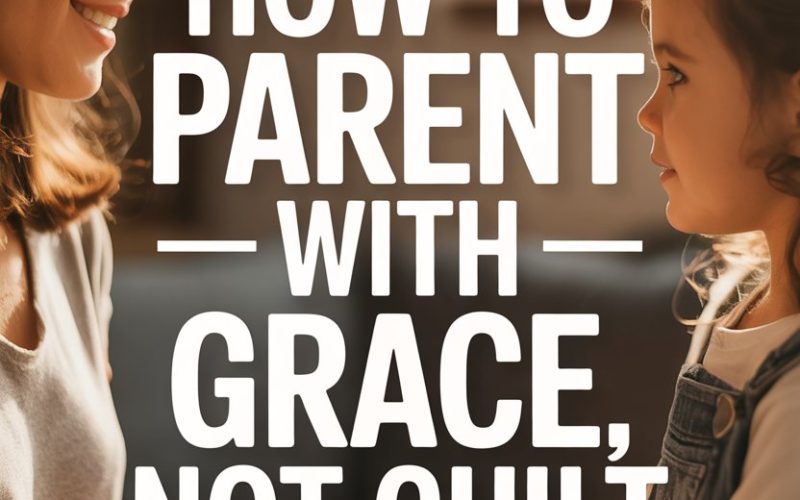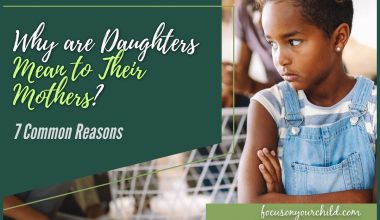Ever noticed how guilt seems to shadow every parenting moment?
Miss a rehearsal for work? Guilt. Serve fish fingers—again? Guilt. Forget the tooth fairy three nights running? (I’m still blaming the cat.) Guilt.
It’s like a buy-one-get-one-free offer you never signed up for.
But grace—now that’s something we could all use more of. Not the pirouetting-down-the-hallway sort, but the forgiving, gentle, deeply human version that lets us breathe easier and love harder.
Let’s talk about parenting with grace and leaving guilt in the laundry basket—where it belongs.
Guilt: The Uninvited Guest at Every Family Meal
Here’s the thing: guilt is incredibly common. According to Psychology Today, most parents feel it regularly, regardless of their choices.
Why? Because parenting is basically an Olympic sport with ever-changing rules and a judging panel of one: your own inner critic.
Notice how guilt so often masquerades as caring? It’s your brain’s clumsy way of showing love.
Trouble is, it rarely leads to helpful action—unless you count buying extra ice cream as a solution for missed bedtime stories.
Why Grace Beats Guilt Every Time
Grace isn’t about letting yourself off the hook for everything. It’s about giving yourself the same kindness you’d offer your child when they spill juice for the third time in an hour.
According to Dr. Kristin Neff’s research, self-compassion actually boosts motivation and emotional resilience—qualities every frazzled parent could use.
Let’s face it, nobody’s winning a gold medal for guilt. But grace? That’s a skill worth practicing.
Stop Comparing—Their Highlight Reel Isn’t Your Behind-the-Scenes
Ever found yourself mid-scroll, convinced every other parent is nailing it? Social media feeds are full of coordinated pyjamas and colour-coded lunchboxes. (Who are these people? And do they have jobs?)
Remember, those are curated snapshots. You’re living the full, unedited saga.
The next time you start comparing, shut down the app and look up. Your kids aren’t asking for Pinterest masterpieces—they’re just after your attention.
Try a five-minute play session or a quick chat about their weird dream last night. Real connection trumps digital envy every time.
Let Go of the Myth of Perfect Parenting
Perfection is about as real in parenting as unicorns with driver’s licences. The Good Enough Mother theory by Donald Winnicott suggests children need a parent who’s present and attuned—not flawless.
Being “good enough” allows kids to develop resilience, independence, and a more realistic view of the world.
Spill milk? Laugh about it. Miss a bedtime story? They’ll survive (and probably remember your silly excuses long after you do).
Your imperfections teach your kids that it’s okay to be human.
Set Boundaries—And Don’t Apologize For Them
Saying no gets a bad rap. But boundaries are just another word for sanity.
Whether it’s switching off your phone during dinner, or refusing to bake three dozen cupcakes at midnight, boundaries protect your energy and model self-respect.
When you set a limit, skip the guilt-trip apology. “We can’t have a friend over tonight, but we’ll plan something fun next weekend.”
Simple. Direct. No need for a song and dance routine (unless you fancy it).
Learn the Fine Art of the Quick Reset
Every parent loses it sometimes. Whether it’s a shouty morning or a day where you’re the human embodiment of a grumpy emoji, grace means forgiving yourself—and moving on.
A swift apology works wonders: “I was cranky this morning. Sorry about that. Want to start again?”
Kids learn more from our recoveries than our mistakes. Bonus points for silly voices or awkward dance moves as part of your reset ritual.
Embrace the Chaos—Mess Is Part of the Job
Show me a spotless house with toddlers and I’ll show you a magician.
Mess is part of raising humans—tiny ones especially. Instead of chasing perfection, try a “15-minute tidy” with music blaring.
Everyone does what they can, then you call it good enough.
On the weekends, lower your standards another notch. Pancakes for dinner? Sure. Pajama day until 2pm? Why not.
Embracing the chaos, even occasionally, sends the message that fun comes before faff.
Practice Saying Yes to Yourself
When’s the last time you did something just for you? Grace means recognising you’re a person, not a parental robot.
Book a coffee with a friend, take a walk alone, watch that rubbish TV show with zero educational value.
Kids benefit from seeing you prioritise your own joy. It models self-care and helps everyone in the house stay saner (and perhaps even a little less shouty).
Keep Communication Real—and Age-Appropriate
Kids are eerily good at detecting stress. If guilt is weighing you down, honesty (within reason) helps. “Mum’s a bit tired today, so we’re having a chilled evening. Tomorrow we’ll do something fun.”
This sets the stage for emotional intelligence and openness.
Don’t overshare your worries, but don’t pretend you’re fine when you’re obviously not—kids know when you’re faking it. A little vulnerability goes a long way towards a more connected family.
Use Your Village—It’s Not Cheating
There’s a reason for the old saying about a village.
Accepting help isn’t a sign of failure; it’s the only way most of us get through. Ask for lifts, swap babysitting, share dinner duties.
If someone offers to pick up your child from school, say yes. If you have family in town, accept the meal or the laundry help.
The only people who think you should do it all alone are probably fictional.
When Guilt Creeps In, Try This
Pause, notice it, and ask: “What’s the story here?” Most guilt comes from unrealistic expectations or old family scripts.
Try reframing: “I missed the school trip, but I made time for a movie night. That’s enough.”
If the guilt is about something that truly matters and you want to change, great. Make a tiny adjustment, then move on. Beating yourself up doesn’t change the past—it just makes the present less fun (for everyone).
Model Grace for Your Kids
Kids copy what they see. If you show kindness to yourself when you mess up, they’ll learn to do the same.
Next time you forget an appointment, say, “Oops, I made a mistake. I’ll try to do better next time.” Then get on with your day.
Watch how quickly your child forgives themselves the next time they lose a shoe or spill paint. Grace is contagious. Spread it generously.
When All Else Fails, Laugh
Sometimes parenting is too absurd not to laugh about.
The toddler who insists on wearing gumboots to bed. The epic tantrum over the “wrong” banana. The science project that explodes in your kitchen.
Laughter is the pressure valve for family life.
It won’t fix dinner or clean up glitter, but it will remind you that you’re all in this together—and that grace is just a giggle away.
Grace in the Gaps
Grace doesn’t mean slacking off. It means letting go of guilt as a motivator, and choosing love (for your kids and yourself) instead.
The next time you feel guilt creeping up, ask yourself: What would grace look like right now?
Maybe it’s ten minutes to yourself. Maybe it’s saying sorry with a smile. Maybe it’s just ordering takeaway and calling it a win.
Parenting never gets easy, but it can get lighter. Grace, not guilt—your secret weapon for surviving and even enjoying the glorious, messy ride.




